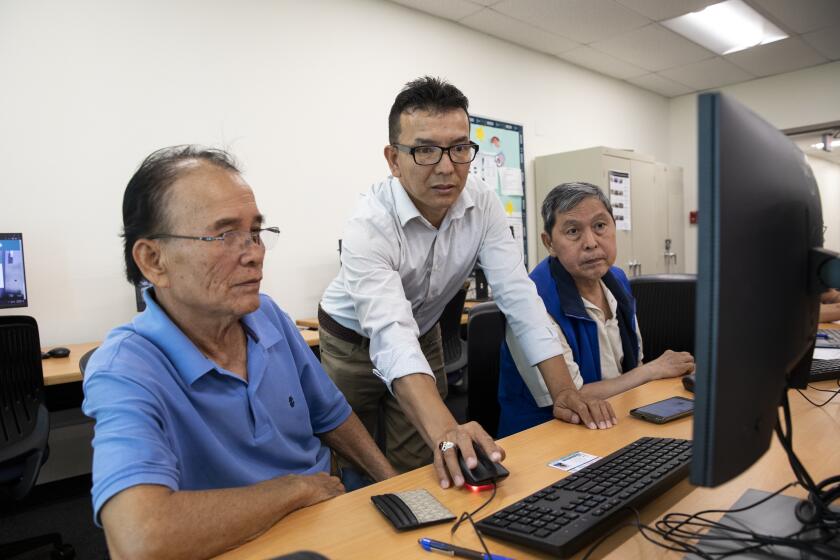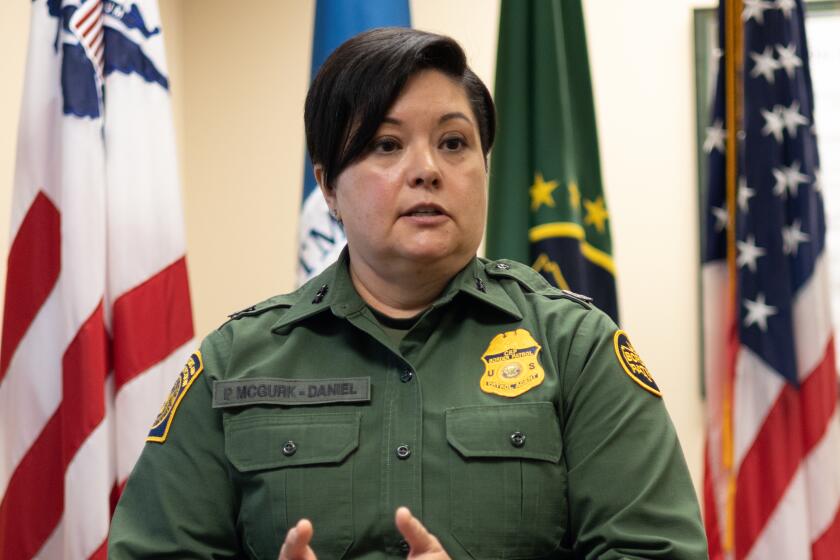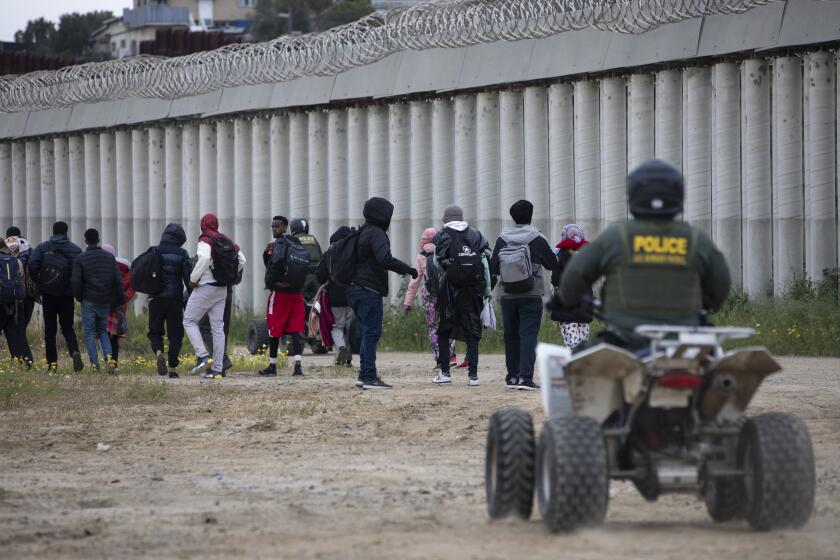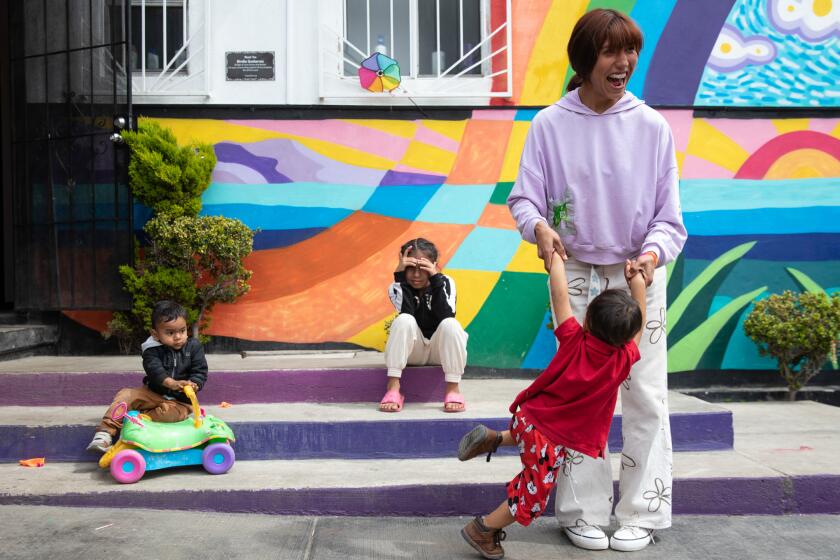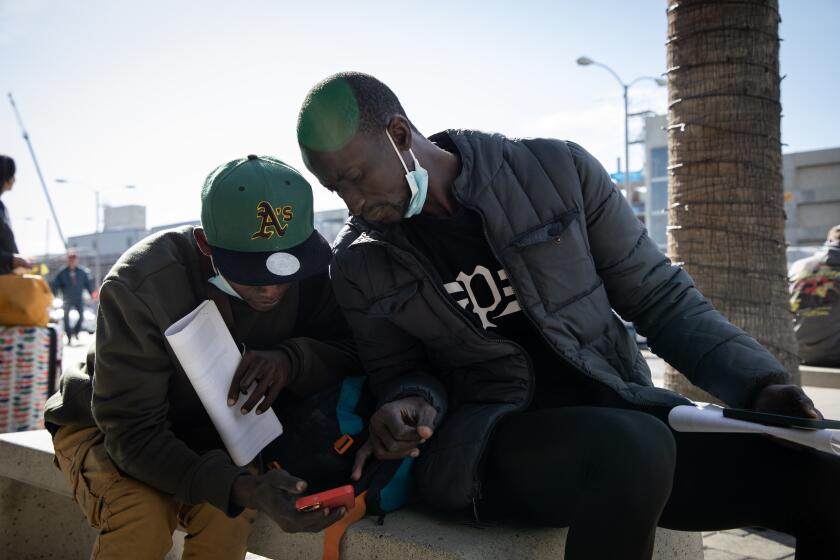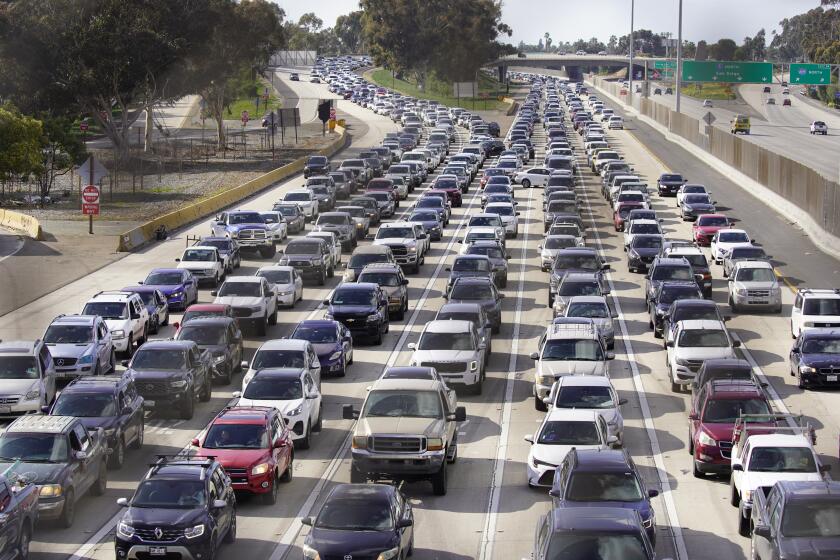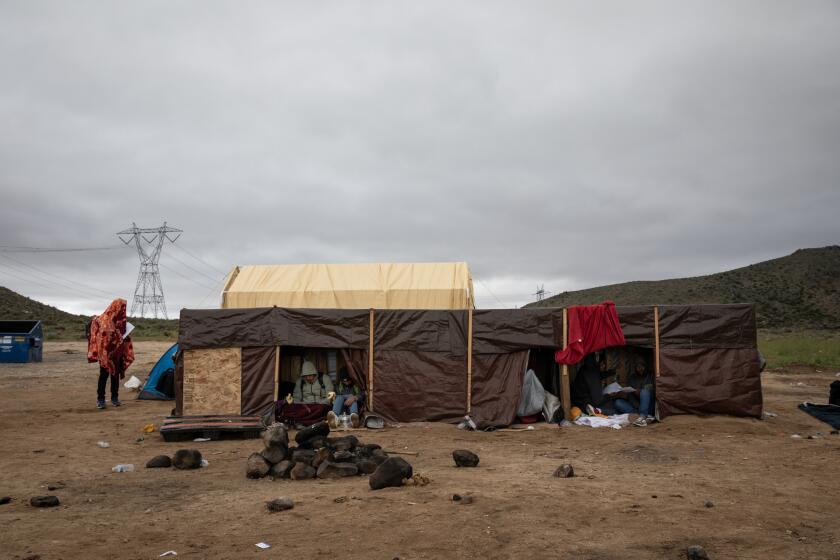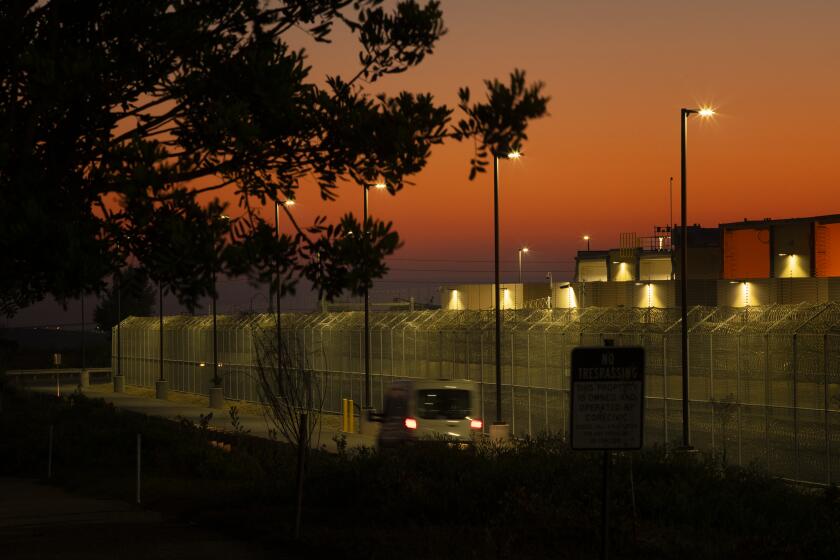Sessions promises prosecutions for all illegal border crossings, including asylum seekers

Publisher Jeff Light and Immigration Reporter Kate Morrissey discuss Attorney General Jeff Sessions visit to the border.
In the Trump administration’s latest move to escalate immigration enforcement, the federal government will now prosecute every person — whether smuggler or asylum seeker — who crosses the border illegally.
Going forward, the Department of Homeland Security will refer everyone caught crossing illegally to the Department of Justice for prosecution in federal criminal court, Attorney General Jeff Sessions announced on Monday while yards away from the border fence at Friendship Park. Paired with a zero-tolerance policy Sessions implemented last week at the DOJ, the move will likely pack federal prisons with migrants.
Any families caught crossing will be separated as the parents will be charged and held in custody. Their children will be turned over to the Department of Health and Human Services.
Asylum seekers who cross illegally between ports of entry will also be prosecuted, Sessions said.
“Today, we’re here to send a message to the world that we’re not going to let our country be overwhelmed,” Sessions said. “People are not going to caravan or otherwise stampede our border.”
Just over a week prior, the migrant caravan that Sessions referenced and its supporters celebrated at Friendship Park before members went to the port of entry in San Ysidro to request asylum. A little over 200 people from the caravan with asylum claims have been processed at the port.
Sessions and other members of the Trump administration railed against the caravan as it made its journey north. At the time, the attorney general called the caravan “a deliberate attempt to undermine our laws and overwhelm our system.”
Though caravan organizers led members to a port of entry for processing, which would not be prosecuted under the new policy, the caravan leaders criticized the new zero-tolerance policy for people fleeing their countries for similar reasons who cross illegally between ports to ask for help.
“Tearing children from the arms of parents who are trying to save them from violence and persecution in their home countries is unconscionably cruel,” said Alex Mensing of Pueblo Sin Fronteras. “Sessions’ mischaracterization of Central American asylum seekers is prejudiced and dangerous and completely ignores the reality of conditions in the Northern Triangle and on the migrant route in Mexico.”
The attorney general sent 35 prosecutors to the southwest border to bring charges in support of his zero-tolerance policy for illegal crossings. He also sent 18 immigration judges to the border to process civil immigration cases more quickly. That is a separate court from the system that will decide criminal convictions for illegal entry or reentry.
“These actions are necessary, and they are made even more necessary by the massive increases in illegal crossings in recent months,” he said.
The number of people arrested by Border Patrol after they were caught illegally crossing into the U.S. rose over the past year after dropping to a historic low of 11,127 in April 2017.
Agents arrested 37,383 people crossing illegally in March 2018 and 38,234 in April. The Trump administration has called the increase a crisis.
The decision to prosecute asylum seekers who cross illegally into the U.S. goes against the Refugee Convention of 1951, which says that the countries signing the agreement will not penalize asylum seekers for illegal entry as long as they present themselves “without delay to the authorities and show good cause for their illegal entry or presence.”
“Persons who enter our border, even if they want to claim asylum, if they don’t come through the port of entry, they would be subject to prosecution. They may yet still be able to make a claim of asylum,” Sessions said. “We’re looking at this entire process of asylum claims, and we’ve got some of our best lawyers thinking through it. We’ve got some improvements to do, I think.”
Thomas Homan, the deputy director of Immigration and Customs Enforcement, who accompanied the attorney general to the border, added, “Everybody is going to get due process. Some of these families have asylum cases, certainly, but many don’t.”
One lone protester wearing an anti-fascist shirt hiked down the beach to reach the park shortly before Sessions began to speak. Megaphone in hand, San Diego resident Will Johnson tried to interrupt Sessions’s speech, calling the attorney general “racist” and “evil.”
“Why are you here? Get out of here!” Johnson said. “We don’t want you in our county. We don’t want you in our state.”
A large yellow kite flew on the Tijuana side of the double fence with a message — “Parques, no muros.” Parks, not walls.
Down the hill in Mexico, a little girl in a pink bathing suit splashed in the waves. Underneath the kite, a band played Norteño music, the cool breeze carrying the bass and accordion across the border to where Sessions stood.
On the U.S. side, four mounted Border Patrol agents watched by the fence.
Sessions is the third high-ranking official from the Trump administration to visit the Southern California border in as many weeks to send a message that the border will be enforced. Homeland Security Secretary Kirstjen Nielsen and Vice President Mike Pence each visited fence construction in Calexico in the last two weeks.
“The illegal flow of immigrants into the country is costing us a good deal,” Sessions said when asked about the repeat trips. “We want to see those numbers go down. California and South Texas are two of the biggest areas with the highest numbers of illegal entrants. That’s why we’re focusing here. Our goal is to have the whole world know that this border is not open.”
The number of people criminally prosecuted for immigration violations decreased 14 percent between fiscal 2016 and fiscal 2017, from 69,636 to 59,910 , according to data from the Transactional Records Access Clearinghouse out of Syracuse University.
That looked likely to change in fiscal 2018 even before Sessions’s new policy announcement. Between February and March, the number of immigration prosecutions increased almost 24 percent, according to TRAC data. Case filings were up about 21 percent from the previous March.
Reentry — a felony — was the most common charge, with 1,794 charges filed in March. Illegal entry — a misdemeanor — was charged 221 times.
The Western District of Texas had the highest number of prosecutions at 611. The Southern District of California was second with 476.
Andrew Nietor, a former Federal Defender whose current practice includes both immigration and criminal law, said he found Sessions’s announcement shocking.
“We’re now going to be treating asylees as criminals instead of adhering to what our obligation is under federal and international law to give asylees the opportunity to make their claim,” Nietor said.
He’d been told that clients would be held in custody in Santa Ana or San Bernardino, requiring the federal government to transport them long distances for court appearances in San Diego. He called the prosecutions a “waste of resources.”
He predicted that the ramp up in prosecutions will flood a system that is not staffed to handle the increase.
“The defense attorneys are going to be overwhelmed,” he said, noting that unlike immigration court, migrants are provided attorneys to represent them in federal criminal court. “The judges are going to be overwhelmed. The U.S. Marshals are going to be overwhelmed.”
Andrea Guerrero, executive director of Alliance San Diego, called the move “draconian.”
“Threatening to prosecute and incarcerate migrants, including parents of children, is neither a practical nor a humane response to people who may be seeking refuge or who may not have a line to stand in to apply for legal status,” Guerrero said. “An enforcement-first and enforcement-only approach is not the answer. It does not reflect our values of inclusion and compassion and does nothing to address an outdated and insufficient immigration system.”
The attorney general gave a speech in the morning in Arizona to the State Association of Criminal Investigative Authorities before flying to San Diego where he met with the acting U.S. attorney at the San Ysidro Port of Entry to discuss immigration enforcement priorities, according to a department official.
He was scheduled to go to Tennessee next to speak at a law enforcement training conference.
Immigration Videos


When children are separated from their parents at the border, here is where they go next
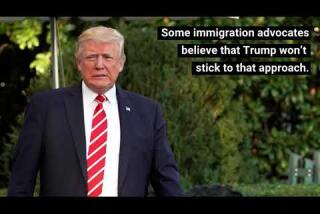
Prospects of a deal for 'Dreamers' may hinge on separating Trump from hard-liners on his staff
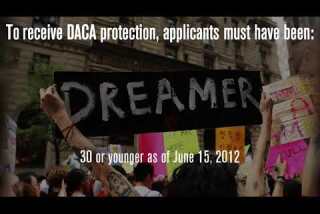
What is DACA?

Border wall prototype contractors selected
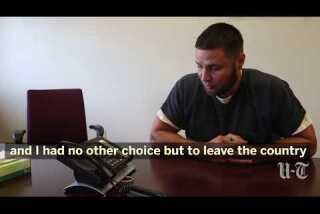
Video: Ukrainian boxer wins asylum in U.S.
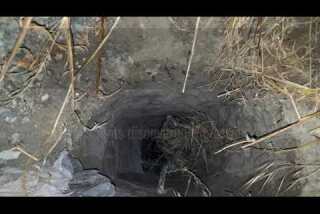
30 apprehended after Border Patrol agents discover tunnel
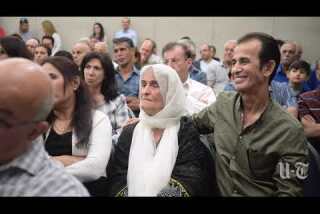
Video: Kurdish diaspora prepare to vote on independence
Follow me on Facebook for live updates about immigration news
kate.morrissey@sduniontribune.com, @bgirledukate on Twitter
Get Essential San Diego, weekday mornings
Get top headlines from the Union-Tribune in your inbox weekday mornings, including top news, local, sports, business, entertainment and opinion.
You may occasionally receive promotional content from the San Diego Union-Tribune.

